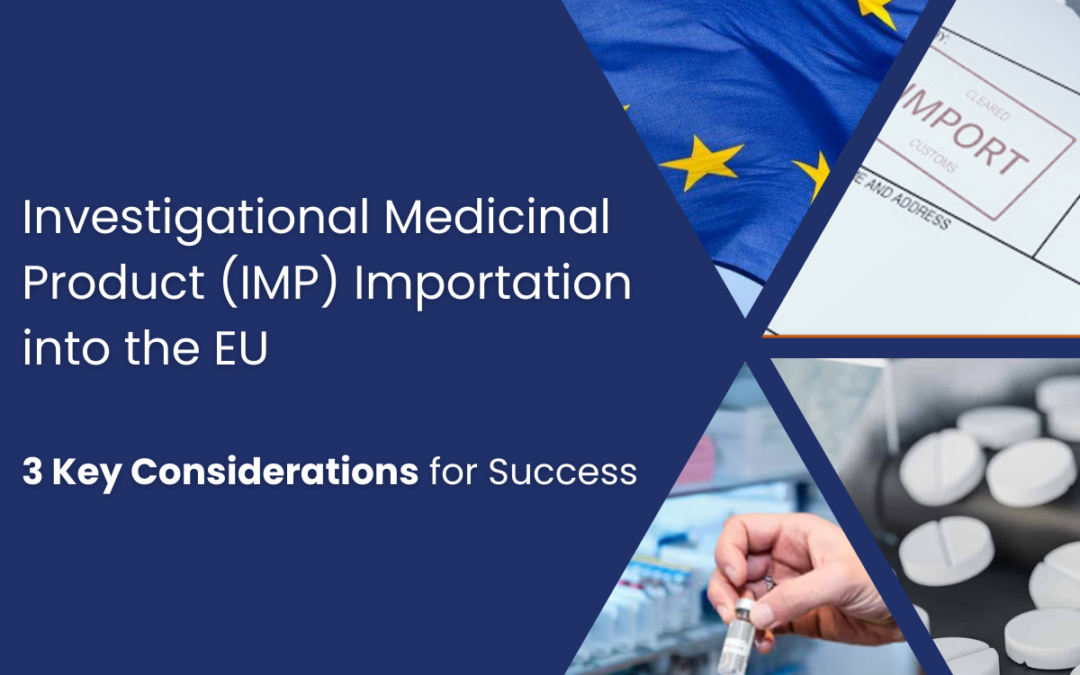If you are planning on conducting clinical trials in the EU and are importing Investigational Medicinal Products (IMPs) then there are many factors to consider prior to clinical trial initiation. An IMP refers to a medicinal product that is being tested or used in a clinical trial to evaluate its efficacy, safety, or pharmacokinetics. The term is defined under the European Union’s Clinical Trials Regulation (EU) No. 536/2014 and applies to any medicine (including vaccines, biologics, cell or gene therapies) that is used in the context of clinical research. Commencing the journey to conduct clinical trials in the EU involves navigating both the specific country and general EU requirements, which is an intricate task.
Here are a few key considerations when importing IMPs into the EU:
1. Regulatory Authorisation
Prior to importing IMPs into the EU for use in clinical trials, you must submit a Clinical Trial Application (CTA) to the National Competent Authority (NCA) in the EU member state where the trial will take place. The CTA is a critical component of conducting clinical trials in the EU. If the proposed clinical trial involves multiple EU countries, the European Medicines Agency (EMA) and the Clinical Trials Regulation (CTR), which came into force in January 2022, provide a centralised process for multi-country trials. However, individual country regulations may still apply and it is recommended to discuss your clinical trial strategy with a regulatory expert.
2. Manufacturer’s /Importation Authorisation (MIA)
A Manufacturer’s/Importation Authorisation (MIA) is required if a company is involved in manufacturing and/or importation activities relating to human, veterinary or investigational medicinal product, within the EU as per GMP Annex 21. The term manufacturing and/or importation includes manufacturing, primary packaging, secondary packaging, physical importation of medicinal products or batch certification of medicinal products. To conduct clinical trials in the EU, it is not required that the Marketing Authorisation Holder (MAH)/Sponsor of the IMP hold their own MIA or hire an internal Qualified Person (QP) but they may partner with a company like HiTech Health who already hold MIAs in both the EU and UK and have a deeply experienced QP team in place. This can save you substantial time and money, thus enabling the MAH/Sponsor to commence clinical trials sooner.
3. Storage and Distribution Controls
Organisations are required to have appropriate controls in place for managing the storage and distribution of IMPs. Compliance with Good Distribution Practice (GDP) will help ensure safety, security and high product quality throughout the EU clinical supply chain. In some cases, IMPs need to be stored in a licenced depot or distribution centre in the EU, which must be approved for storing IMPs. Companies should consider how product temperature requirements will be maintained throughout the importation, storage and distribution activities.
HiTech Health holds both EU and UK MIAs as well as the ability to act as IOR for both the EU and the UK, allowing us to support global clients in overcoming complex challenges of importing IMPs and conducting clinical trials Europe as well as the UK. Our team have extensive hands-on experience with all aspects of importing IMPs into the EU/UK for clinical use including complex products such as cell or gene therapies, where direct to site importation is often required. By partnering with HiTech Health, our team guide you through the EU requirements and allow you to focus on other core business areas such as product development, clinical studies, and market access planning.
Schedule a call with our team today to learn more about our services and how we can support your organisation.
IE: +353-1-9631489 | UK: +44-20-30267419 | US: +1-857-3265835
Email: info@hitech-health.com

